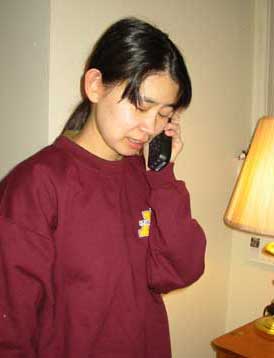Exercise
9:
Simulation Exercise for Apologizing – 1
Read the situation below and complete the dialogue as if you
were speaking in real life.
Type your answer in each box. Later you
will be asked to
reflect on your language use.
You are a college student.
You have an appointment with a senior professor, Professor Ito in another
department to discuss your project. He
is in his late 50s and although you have communicated with him by e-mail,
you have not met him yet. The appointment is at 3 today. However, for
some reason,
you find that you will not be able to make it. You call the professor
and ask if he could change the appointment.
The professor sounds reluctant.
Now try to use apology expressions
effectively. You can give realistic reasons that you think would
be appropriate for requesting a change in the appointment. Be careful
of the way you present them!

|

